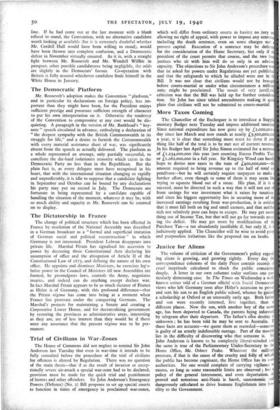Trial of Civilians in War - Zones The House of Commons did
not neglect to remind Sir John Anderson last Tuesday that even in war-time it intends to be fully consulted before the procedure of the trial of civilians for offences is altered by Regulation. There was no question of the main thesis—that if as the result of invasion or excep- tionally severe air-attack a special war-zone had to be declared, provision must be made for the quick trial and punishment of looters and other offenders. Sir John Anderson's Emergency Powers (Defence) (No. 2) Bill proposes to set up special courts to function in times of emergency in proclaimed war-zones, which will differ from ordinary courts in having no jury a allowing no right of appeal, with power to impose any semen including the death sentence, even on some charges not present capital. Execution of a sentence may be deferr for the consideration of the Home Secretary, but only if president of the court permits that course, and the two 1 justices who sit with him will do so only in an adviso capacity. The objections to Sir John Anderson's procedure w that he asked for powers under Regulations not yet publish and that the safeguards to which he alluded were not in Bill. It was not clear that civilians would not be brou before courts-martial or under what circumstances a milit zone might be proclaimed. The result of very justifia criticism was that the Bill was held up for further conside tion. Sir John has since tabled amendments making it qui plain that civilians will not be submitted to courts-martial.


































 Previous page
Previous page